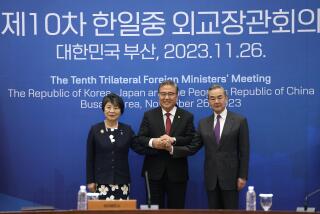Koreas Agree to More Reunions
- Share via
TOKYO — North and South Korea agreed today to hold a round of family reunions in mid-October and to resume ministerial-level meetings, in what analysts see as modest progress after six months of chilled relations between the two Cold War foes.
“This is a gesture by both sides to show the international society they can move forward,” said Park Jai Chang, a political science professor at Sook Myong Women’s University. “That said, the impact of the reunion won’t change very much. South Koreans are now looking for more fundamental progress and evidence of a different attitude from the North.”
The two sides also hinted at further likely progress toward setting up a cross-border rail link and coordinating flood-control projects.
“Quite a few agreements have been reached on a series of cooperation and exchange issues for advancing North-South relations,” the North’s chief delegate, Kim Ryong Song, said without elaborating.
The family reunions are scheduled for Oct. 16-18, while the ministerial-level meetings are planned for Oct. 28-31.
Despite the rather tepid concessions, analysts said that even these may be more than the North initially intended to extend. Last Tuesday’s attack on the World Trade Center and the Pentagon changed a great deal, including the U.S. resolve to fight global terrorism. And North Korea is a state long associated with global terrorism. The result, the analysts say, is that Pyongyang arrived with a big interest in appearing more moderate and reasonable to avoid becoming a target of U.S. retaliatory action.
“If they now realize the American threat not to tolerate such behavior by rogue states is more credible, the U.S. bargaining position could be enhanced,” said Hong Sung Gul, a professor at Kookmin University. “We could see North Korea make more concessions over the next few months.”
The South Korean administration entered the four-day North-South talks with its own vulnerabilities. President Kim Dae Jung recently lost his political majority in the National Assembly, his chief advisor on North Korea resigned, the South Korean economy is weak, political reforms have stalled and Kim’s “sunshine policy” of North-South reconciliation is largely discredited.
Showing progress with the North represents one of the few ways Kim can hope to recover lost ground quickly.
Though South Koreans today welcomed the prospect of more reunions, many said it will take more than this to get them excited. “I hope elderly people will have a chance to meet their long-lost relatives,” said Choo Eun Kyong, a 39-year-old housewife. “But I still have doubts about the sincerity of North Korea. They could change their mind again.”
Furthermore, another round of reunions involving 100 or so Koreans after half a century of hostilities is little solace for the estimated 10 million people all told on both sides of the border who have relatives on the other side. At the rate of four rounds of reunions in little over a year, it would take well over 100 years to satisfy all the Koreans who want to visit.
“It’s the same story again--a few hundred people meeting in one place just once with limited communication between the countries,” said Mo Jong Ryn, a public policy professor at Yonsei University. “I don’t think the president will regain his popularity just because of this.”
Critics say most of the concessions by Pyongyang so far have been largely symbolic, including the historic summit 15 months ago in the northern capital. Even a return visit to Seoul by North Korean leader Kim Jong Il threatens to ring hollow, they add, unless it’s accompanied by more tangible steps, including direct mail service between the two countries, more people-to-people contact and a North Korean agreement to reduce production and export of missiles.
Economic assistance by the South, a likely prerequisite for closer ties, also has come under growing criticism as South Koreans struggle against higher unemployment and falling consumer confidence.
Despite all the hurdles, some optimists see hope. “Both sides failed to achieve what they hoped to gain, but they agreed on a halfway settlement,” said Lee Jong Seok, a researcher at the government-funded Sejong Institute. “I think both sides meant business, rather than using these for grandstanding or political propaganda.”
*
Chi Jung Nam in The Times’ Seoul Bureau contributed to this report.
More to Read
Sign up for Essential California
The most important California stories and recommendations in your inbox every morning.
You may occasionally receive promotional content from the Los Angeles Times.










